The Express
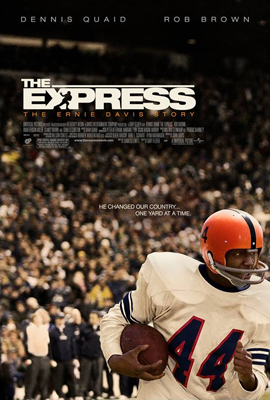
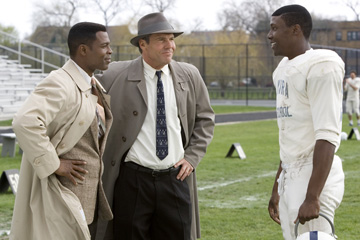 Ernie Davis (portrayed in this film by Rob Brown from Stop-Loss) is famous for being the first African American athlete to win the Heisman Trophy after leading his Syracuse, New York college football team through many championship games and undefeated seasons. He faced prejudice and a changing nation of the late 50s and early 60s. He was met by hatred and racism in some of the cities his team played in, but he never let it obscure or side track his personal goals. Tragically, his budding career was cut short just as he was drafted to play professional football for the Cleveland Browns after college. He was struck with leukemia, and never actually got to play a single professional game. He lost his life to the disease at only the age of 23, but is still remembered for not just his talent for the game he played, but also for the racial barriers he helped knock down.
Ernie Davis (portrayed in this film by Rob Brown from Stop-Loss) is famous for being the first African American athlete to win the Heisman Trophy after leading his Syracuse, New York college football team through many championship games and undefeated seasons. He faced prejudice and a changing nation of the late 50s and early 60s. He was met by hatred and racism in some of the cities his team played in, but he never let it obscure or side track his personal goals. Tragically, his budding career was cut short just as he was drafted to play professional football for the Cleveland Browns after college. He was struck with leukemia, and never actually got to play a single professional game. He lost his life to the disease at only the age of 23, but is still remembered for not just his talent for the game he played, but also for the racial barriers he helped knock down.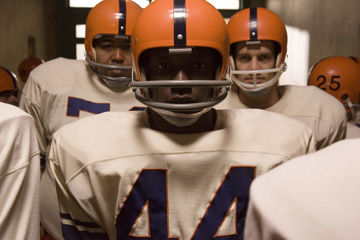 This is the kind of life story a Hollywood screenwriter dreams of. Right there, you have all the elements of human triumph and tragedy, and it can easily be squeezed into a typical Hollywood formula. And yet, screenwriter Charles Leavitt (Blood Diamond) does something most of these films usually don't do, in that he doesn't completely white wash over the harder aspects of the story. A lot of this has to do with the character of Coach Ben Schwartzwalder (Dennis Quaid), who beat out a lot of competitive colleges (including Notre Dame) to have Ernie play for his school team. Schwartzwalder was one of the early coaches who adopted the idea of using both white and African American players on the same team, and at the time the story begins, was famous for previously having Jim Brown (Darrin Dewitt Henson) on his team, who had just been drafted by the NFL when Ernie enters the team. Even though Ben Schwartzwalder was open to having a mixed team of players, we still get a sense that there are times when he is uncomfortable around Ernie Davis. The movie does not turn him into a saint. The relationship that develops between Ernie and Ben is a complex one that holds a lot of respect, but also a hint of fear between the two men. They sometimes don't even seem to know how to talk to each other.
This is the kind of life story a Hollywood screenwriter dreams of. Right there, you have all the elements of human triumph and tragedy, and it can easily be squeezed into a typical Hollywood formula. And yet, screenwriter Charles Leavitt (Blood Diamond) does something most of these films usually don't do, in that he doesn't completely white wash over the harder aspects of the story. A lot of this has to do with the character of Coach Ben Schwartzwalder (Dennis Quaid), who beat out a lot of competitive colleges (including Notre Dame) to have Ernie play for his school team. Schwartzwalder was one of the early coaches who adopted the idea of using both white and African American players on the same team, and at the time the story begins, was famous for previously having Jim Brown (Darrin Dewitt Henson) on his team, who had just been drafted by the NFL when Ernie enters the team. Even though Ben Schwartzwalder was open to having a mixed team of players, we still get a sense that there are times when he is uncomfortable around Ernie Davis. The movie does not turn him into a saint. The relationship that develops between Ernie and Ben is a complex one that holds a lot of respect, but also a hint of fear between the two men. They sometimes don't even seem to know how to talk to each other.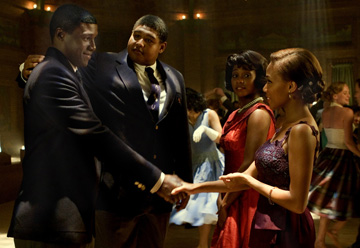 What I liked about The Express is that it is confident in its own story, and doesn't feel the need to hit us over the head with its racially-charged message. It doesn't pretend that its audience has never heard it before, so it hits all the right notes without ever hitting them too hard. The movie is mainly focused on his football career anyway, so it's a good thing that a lot of the game scenes are well shot and set up. The movie spends enough time off the field as well, so we get to meet some of the other people in Ernie's life, such as his friend on the team, Jack Buckley (Omar Benson Miller from Miracle at St. Anna), and his budding relationship with another student on campus, Sarah Ward (Nicole Behaire). But it is the relationship between Ernie and Schwartzwalder that gets the most attention, and mainly won me over. It's not just the complex relationship I mentioned earlier that they have, but both Rob Brown and Dennis Quaid give fantastic performances here, and play off of each other very well.
What I liked about The Express is that it is confident in its own story, and doesn't feel the need to hit us over the head with its racially-charged message. It doesn't pretend that its audience has never heard it before, so it hits all the right notes without ever hitting them too hard. The movie is mainly focused on his football career anyway, so it's a good thing that a lot of the game scenes are well shot and set up. The movie spends enough time off the field as well, so we get to meet some of the other people in Ernie's life, such as his friend on the team, Jack Buckley (Omar Benson Miller from Miracle at St. Anna), and his budding relationship with another student on campus, Sarah Ward (Nicole Behaire). But it is the relationship between Ernie and Schwartzwalder that gets the most attention, and mainly won me over. It's not just the complex relationship I mentioned earlier that they have, but both Rob Brown and Dennis Quaid give fantastic performances here, and play off of each other very well.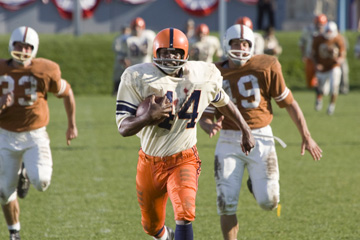 If there's any problem I did have with the film, it's that I wanted the movie to spend as much time with his outside life as his life on the field. Since his football career takes up much of the film's two hour+ running time, we never quite get as close to the people around him in quite the same way we do with the Coach. His relationship with Sarah is pretty underdeveloped to the point that she probably could have been written out of the film with little consequence. We also don't get to see enough of Ernie's family life, particularly Willie "Pops" Davis (Charles S. Dutton), Ernie's grandfather, who obviously played a large role in shaping him into the man he grew up to be. And yet, just as I would start to grow restless, the movie would turn around and make another right move. I particularly liked the way the movie handles his illness near the end, and does not allow itself to turn heavy handed or emotional. There is no weepy bedside scene or anything like that, but there is a very powerful scene where Ernie talks about his disease to the public for the first time in a press conference that is well done and honest.
If there's any problem I did have with the film, it's that I wanted the movie to spend as much time with his outside life as his life on the field. Since his football career takes up much of the film's two hour+ running time, we never quite get as close to the people around him in quite the same way we do with the Coach. His relationship with Sarah is pretty underdeveloped to the point that she probably could have been written out of the film with little consequence. We also don't get to see enough of Ernie's family life, particularly Willie "Pops" Davis (Charles S. Dutton), Ernie's grandfather, who obviously played a large role in shaping him into the man he grew up to be. And yet, just as I would start to grow restless, the movie would turn around and make another right move. I particularly liked the way the movie handles his illness near the end, and does not allow itself to turn heavy handed or emotional. There is no weepy bedside scene or anything like that, but there is a very powerful scene where Ernie talks about his disease to the public for the first time in a press conference that is well done and honest.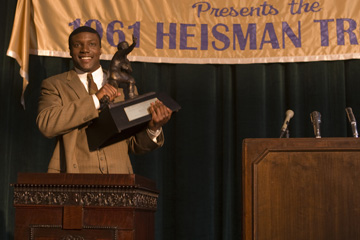
See related items at Amazon.com!






0 Comments:
Post a Comment
<< Home